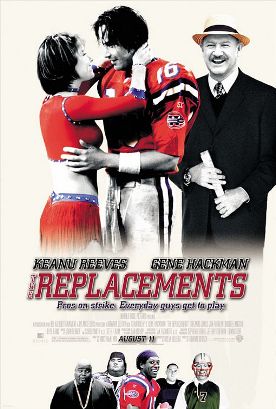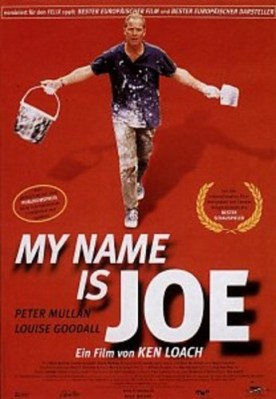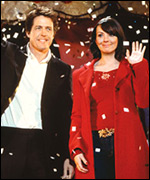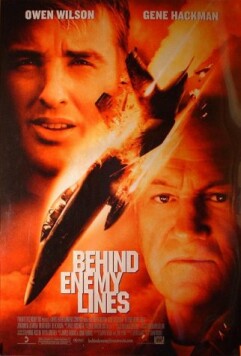Replacements, The
There are a lot of things wrong with Howard Deutch’s new film, The Replacements, beginning with the fact that it is a football movie and therefore, in my view, extremely limited in its scope for originality. But it is just about worth seeing. There are some good jokes — I especially liked the one where the star-struck replacement players are taking photos and asking autographs of the guys whom they are replacing, even as the latter are cursing them and calling them scabs — but a lot of the humor is rather heavy-handed and doesn’t work very well. The drama is better, manifesting an old- fashioned sense of what drama requires to be effective as honest worth and humility prevail over pride, privilege and arrogance.
True enough, it is easy for such an old-fashioned moral drama to turn heavy-handed as well, as this does in its portrayal of the spoiled millionaire of a quarterback for whom our poor- but-honest pro-washout hero, Shane Falco (Keanu Reeves), takes over. “I’m an all-pro quarterback,” this character tells his replacement; “I’ve got two Super Bowl rings…and you guys will never be anything more than replacement players.” Boo! Hiss! Do you hate him enough yet? Well, in case you don’t, you can stoke up a bit more on the scene in which, in mock sympathy with Falco, he tells him that “The cruelest thing they can give guys like you, Shane, is hope.” Making the guy a jerk seems to me somewhat to take away from the point, stressed elsewhere, that even if these overpaid pros are not jerks, they have been corrupted by a system inimical to traditional sporting virtues.
But where the film scores is in its portrayal of these same virtues, which include courage and team spirit and what crusty old coach Jimmy McGinty (Gene Hackman) calls, in the very words of the song of the same name from Damn Yankees, “Heart.” McGinty tells his lovable, rag-tag team of laborers and criminals and bar-bouncers: “You’re professionals; you’re being paid to play. The guys you’re replacing forgot that a long time ago.” It’s not quite what he means, I think, since the fact that they are being paid is the one thing the spoiled prima donnas for whom the replacements are taking over do remember. It’s typical of the movie’s little sloppinesses. But the more general point that something essential has gone out of the game since it became a billion-dollar business is lurking in there somewhere.
More important is the fact that the film has some idea of what it is. Again, there are several false starts, such as its excessive dose of the irrelevant femininist individualism of Gloria Gaynor’s “I Will Survive” (chosen, presumably, for its vaguely inspirational quality). There is also a brief flirtation with touchy-feely, therapeutic language when Coach McGinty has the guys talk about their greatest fears on the eve of the big game. At first this looks like a comic send-up, as one guy says, rather uncertainly, that “Spiders really creep me out.” Soon everybody is talking about creepie crawlies. Shane leads the way back to the subject by confiding his fear of failure, and the other guys say they’re afraid of having to go back to jail, or the minimart or the factory. Though doubtless this is what many of them would feel, doesn’t it make the wrong point here for them to say it? Surely success can’t be shown as being for them exactly what it is for the mercenaries they replace?
But in one key respect — and this is the main thing — the film does not present us with football glory translated into mere glamour, for it resists what must have been the almost overwhelming temptation to have everything come out well for our hero and present him at the end with a pro contract of his own. Instead, “Heart” means that you’re playing the game for its own sake. “These guys are playing like there’s no tomorrow,” say John Madden and Pat Summerall, playing themselves — and then realize that, for once, the cliché is really true. Down on the field, the guys themselves are even less articulate about what they are doing and why they are doing it, but there are worse summings up than Shane’s in the huddle before the big play of the game: “Pain heals; chicks dig scars; glory lasts forever.”
At any rate, the film’s “Heart” is in the right place, and its evocation of the masculine, quasi-martial world of football, implausible though the whole scenario may be, is what makes it a good-bad film, which to me is better than a bad-good — or, as we most often say these days, a “pretentious” — film. There’s no pretension to The Replacements. When Shane signs off by saying, “Gentlemen, it’s been an honor to share the field of battle with you,” or when the tight end, who is deaf, receives a crucial pass and makes the signal with his arms to the crowd to cheer louder, it may be corny, but the corniness is of a kind that our national life and culture has been low on for a long time — and that we need more of.
Discover more from James Bowman
Subscribe to get the latest posts to your email.







